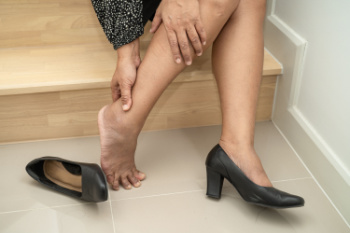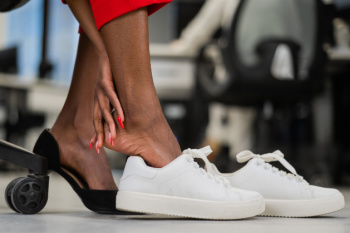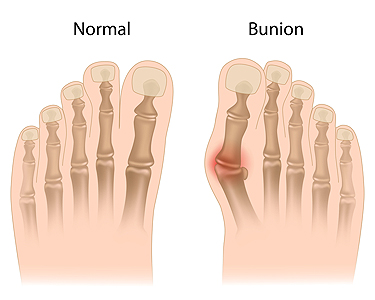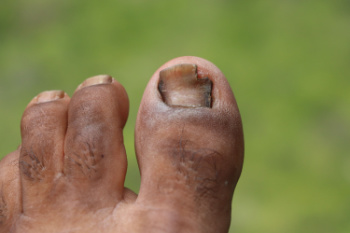Connect With Us
Blog

When foot pain becomes chronic and does not improve with rest or basic care, radiologic evaluation can help uncover the cause. X-rays are often the first step, useful for detecting fractures, arthritis, or structural changes. If soft tissue issues are suspected, such as tendon injuries, nerve problems, or inflammation, an MRI or ultrasound scan may be recommended. CT scans offer detailed images of complex bone structures and are sometimes used for surgical planning. These imaging tools allow podiatrists to see beyond the surface, helping to identify hidden conditions that might not be obvious through physical examination alone. Accurate imaging leads to more effective treatment by targeting the exact source of pain. If you have ongoing foot pain that remains unexplained, it is suggested you see a podiatrist for a diagnosis and appropriate treatment.
Foot Pain
Foot pain can be extremely painful and debilitating. If you have a foot pain, consult with Dr. Nicholas Przystawski from Central Florida Foot Care, PA. Our doctor will assess your condition and provide you with quality foot and ankle treatment.
Causes
Foot pain is a very broad condition that could be caused by one or more ailments. The most common include:
- Bunions
- Hammertoes
- Plantar Fasciitis
- Bone Spurs
- Corns
- Tarsal Tunnel Syndrome
- Ingrown Toenails
- Arthritis (such as Gout, Rheumatoid, and Osteoarthritis)
- Flat Feet
- Injury (from stress fractures, broken toe, foot, ankle, Achilles tendon ruptures, and sprains)
- And more
Diagnosis
To figure out the cause of foot pain, podiatrists utilize several different methods. This can range from simple visual inspections and sensation tests to X-rays and MRI scans. Prior medical history, family medical history, and any recent physical traumatic events will all be taken into consideration for a proper diagnosis.
Treatment
Treatment depends upon the cause of the foot pain. Whether it is resting, staying off the foot, or having surgery; podiatrists have a number of treatment options available for foot pain.
If you have any questions, please feel free to contact our office located in Leesburg, FL . We offer the newest diagnostic and treatment technologies for all your foot care needs.

When adults experience heel pain, a podiatrist begins diagnosis by asking detailed questions about symptoms, daily activities, and any recent injuries. The exact location of the pain, whether under the heel, behind it, or on the sides, can help identify the cause. Common conditions include plantar fasciitis, Achilles tendinopathy, or heel spurs. During a physical exam, the podiatrist checks for tenderness, swelling, range of motion, and how the foot functions during movement. Gait analysis may reveal abnormal foot mechanics. Imaging tests such as X-rays or ultrasound are sometimes used to detect bone spurs, soft tissue damage, or stress fractures. In certain cases, lab tests may be ordered to rule out systemic conditions. Because heel pain can have many causes and may worsen without treatment, it is suggested that you see a podiatrist for an accurate diagnosis and an effective treatment plan.
Many people suffer from bouts of heel pain. For more information, contact Dr. Nicholas Przystawski of Central Florida Foot Care, PA. Our doctor can provide the care you need to keep you pain-free and on your feet.
Causes of Heel Pain
Heel pain is often associated with plantar fasciitis. The plantar fascia is a band of tissues that extends along the bottom of the foot. A rip or tear in this ligament can cause inflammation of the tissue.
Achilles tendonitis is another cause of heel pain. Inflammation of the Achilles tendon will cause pain from fractures and muscle tearing. Lack of flexibility is also another symptom.
Heel spurs are another cause of pain. When the tissues of the plantar fascia undergo a great deal of stress, it can lead to ligament separation from the heel bone, causing heel spurs.
Why Might Heel Pain Occur?
- Wearing ill-fitting shoes
- Wearing non-supportive shoes
- Weight change
- Excessive running
Treatments
Heel pain should be treated as soon as possible for immediate results. Keeping your feet in a stress-free environment will help. If you suffer from Achilles tendonitis or plantar fasciitis, applying ice will reduce the swelling. Stretching before an exercise like running will help the muscles. Using all these tips will help make heel pain a condition of the past.
If you have any questions please contact our office located in Leesburg, FL . We offer the newest diagnostic and treatment technologies for all your foot and ankle needs.

Bunions are bony bumps that form at the base of the big toe, as the tip of the toe angles toward the second toe. Over time, bunions can become more noticeable, and the skin over the bump may appear red and inflamed. The area can be painful, especially when pressure is applied, making it difficult to wear certain shoes or walk comfortably. Bunions are common in individuals who wear tight or ill-fitting shoes, particularly women who wear high heels. However, they can also be caused by genetic factors, abnormal foot structure, or conditions like arthritis. The symptoms include pain, swelling, and the appearance of a hard bump at the joint of the big toe. A podiatrist can help by diagnosing the condition and offering treatments such as custom orthotics, padding, or even surgery in severe cases. If you are dealing with this condition, it is suggested that you make an appointment with a podiatrist.
If you are suffering from bunions, contact Dr. Nicholas Przystawski of Central Florida Foot Care, PA. Our doctor can provide the care you need to keep you pain-free and on your feet.
What Is a Bunion?
A bunion is formed of swollen tissue or an enlargement of boney growth, usually located at the base joint of the toe that connects to the foot. The swelling occurs due to the bones in the big toe shifting inward, which impacts the other toes of the foot. This causes the area around the base of the big toe to become inflamed and painful.
Why Do Bunions Form?
Genetics – Susceptibility to bunions are often hereditary
Stress on the feet – Poorly fitted and uncomfortable footwear that places stress on feet, such as heels, can worsen existing bunions
How Are Bunions Diagnosed?
Doctors often perform two tests – blood tests and x-rays – when trying to diagnose bunions, especially in the early stages of development. Blood tests help determine if the foot pain is being caused by something else, such as arthritis, while x-rays provide a clear picture of your bone structure to your doctor.
How Are Bunions Treated?
- Refrain from wearing heels or similar shoes that cause discomfort
- Select wider shoes that can provide more comfort and reduce pain
- Anti-inflammatory and pain management drugs
- Orthotics or foot inserts
- Surgery
If you have any questions, please feel free to contact our office located in Leesburg, FL . We offer the newest diagnostic and treatment technologies for all your foot care needs.

Athletes are more likely to develop onychomycosis, a fungal infection of the toenails. Constant sweating, wearing tight shoes, and exposure to communal areas like locker rooms create an ideal environment for fungus to thrive. Repetitive trauma to the toenails from running or sporting activity can also make nails more vulnerable to infection. Early signs include discoloration, thickening, and crumbling of the nail. If left untreated, onychomycosis can cause pain, make wearing shoes difficult, and even lead to secondary bacterial infections. Treatment often involves topical antifungal medications, oral prescriptions, or laser therapy. Athletes can help prevent onychomycosis by keeping their feet clean and dry, changing socks regularly, wearing breathable shoes, and using shower shoes in public areas. If you notice changes in your toenails, it is suggested that you see a podiatrist for diagnosis and appropriate treatment.
If left untreated, toenail fungus may spread to other toenails, skin, or even fingernails. If you suspect you have toenail fungus it is important to seek treatment right away. For more information about treatment, contact Dr. Nicholas Przystawski of Central Florida Foot Care, PA. Our doctor can provide the care you need to keep you pain-free and on your feet.
Symptoms
- Warped or oddly shaped nails
- Yellowish nails
- Loose/separated nail
- Buildup of bits and pieces of nail fragments under the nail
- Brittle, broken, thickened nail
Treatment
If self-care strategies and over-the-counter medications does not help your fungus, your podiatrist may give you a prescription drug instead. Even if you find relief from your toenail fungus symptoms, you may experience a repeat infection in the future.
Prevention
In order to prevent getting toenail fungus in the future, you should always make sure to wash your feet with soap and water. After washing, it is important to dry your feet thoroughly especially in between the toes. When trimming your toenails, be sure to trim straight across instead of in a rounded shape. It is crucial not to cover up discolored nails with nail polish because that will prevent your nail from being able to “breathe”.
In some cases, surgical procedure may be needed to remove the toenail fungus. Consult with your podiatrist about the best treatment options for your case of toenail fungus.
If you have any questions, please feel free to contact our office located in Leesburg, FL . We offer the newest diagnostic and treatment technologies for all your foot care needs.
